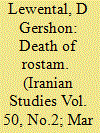| Srl | Item |
| 1 |
ID:
151802


|
|
|
|
|
| Summary/Abstract |
The death of the Persian dynast Rostam b. Farrokh-Hormozd at the Battle of al-Qādisiyyah during the Arab-Islamic conquest of Iran received much attention in both the Islamic conquest literature and the Persian epic tradition canonized in the Shāh-nāmeh. A careful examination of the narratives of early Islamic history teaches us much about the mindset of those living in the first centuries following the momentous events of the seventh century. By removing the layers of literary embellishment and moralistic exegesis, we can understand better the impact of the death of this Sāsānian dynast. In addition, by comparing the narrative traditions, we can uncover valuable testimony regarding the early development of what might later be described as an Islamic Iranian identity.
|
|
|
|
|
|
|
|
|
|
|
|
|
|
|
|
| 2 |
ID:
134506


|
|
|
|
|
| Summary/Abstract |
Rhetoric espoused by the Baʿthi regime of Iraq reflected a deliberate mix of nationalistic and religious elements, most clearly expressed in the discourse surrounding the war with Iran, termed ‘Saddam's Qadisiyyah’, after a battle during the Arab-Islamic conquests, which Saddam Husayn turned into a metaphor for Arab-Iranian relations. As the memory of the seventh century engagement was popularized in Iraq, Qadisiyyah nomenclature spread throughout the Arab world (and beyond) and Saddam's political paradigm found acceptance among Arab governments and western observers alike. Saddam used this propaganda campaign to three ends: (1) to portray the political conflict with Iran as an ancient ethnic clash; (2) to promote his cult of personality; and (3) to present a successful precedent for Arab victory over Iran. In doing so, Saddam forged a new ‘Arab-Islamist’ discourse, combining religious faith with nationalist sentiment, which he embraced with increasing reliance to the end of his rule. Today, radical Sunni Islamist groups have assumed the mantle of this rhetoric.
|
|
|
|
|
|
|
|
|
|
|
|
|
|
|
|